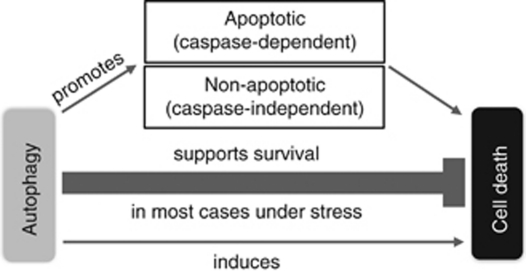Figure 2.
Autophagy in cell survival and cell death. In most circumstances autophagy acts as a survival mechanism, for example, by lowering cell metabolism and supplying nutrients under starvation conditions, or by maintaining quality control in rapidly growing cells (such as oncogene-transformed cells). Autophagy also has specific and context-dependent roles in cell death. It can promote both caspase-dependent apoptotic cell death (e.g., during Drosophila larval salivary gland degradation) and non-apoptotic cell death when caspases are inhibited (e.g., in certain tumour cells). In addition, autophagy has a more direct role in mediating cell death in specific contexts (e.g., in the degradation of Drosophila larval midgut). The exact mechanism(s) regulating autophagic cell death remains to be determined

